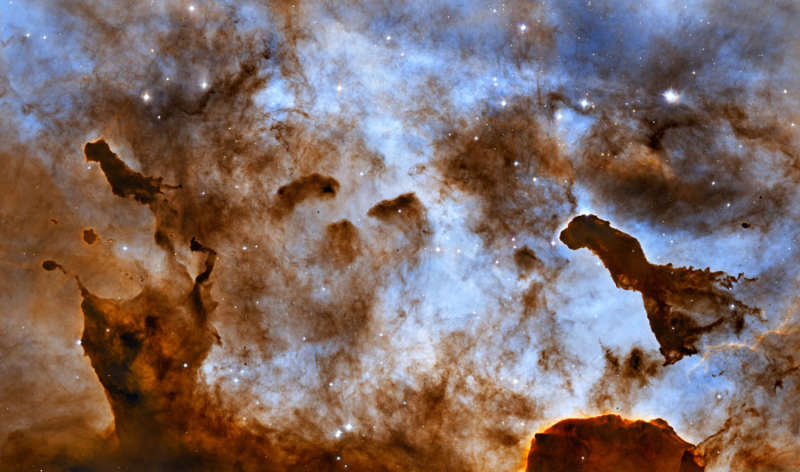
|
Credit & Copyright: NASA,
ESA,
et al.,
& Hubble Heritage Team
(STScI/AURA);
Acknowledgement: M. Livio (STScI) & N. Smith (UC Berkeley)
Explanation:
What dark forms lurk in the mists of the Carina Nebula?
These ominous figures are actually
molecular clouds,
knots of molecular gas and
dust so thick they have become
opaque.
In comparison, however,
these clouds are typically
much less dense than
Earth's atmosphere.
Pictured above is part of the most detailed image of the
Carina Nebula ever taken, a part where dark
molecular clouds are particularly prominent.
The image has recently been
retaken and then re-colored based on light emitted by oxygen.
The entire
Carina Nebula
spans over 300
light years
and lies about 7,500 light-years away in the
constellation of Carina.
NGC 3372, known as the Great Nebula in Carina,
is home to massive stars and changing nebula.
Eta Carinae, the most energetic
star in the nebula, was one of the brightest stars in the sky in the 1830s, but then
faded dramatically.
Wide-field annotated and zoomable versions of the larger image composite are also available.
Acknowledgement: M. Livio (STScI) & N. Smith (UC Berkeley)
|
January February March April May June July August September October November December |
| ||||||||||||||||||||||||||||||||||||||||||||||||
NASA Web Site Statements, Warnings, and Disclaimers
NASA Official: Jay Norris. Specific rights apply.
A service of: LHEA at NASA / GSFC
& Michigan Tech. U.
Based on Astronomy Picture
Of the Day
Publications with keywords: carina nebula - dark cloud - molecular cloud
Publications with words: carina nebula - dark cloud - molecular cloud
See also:
